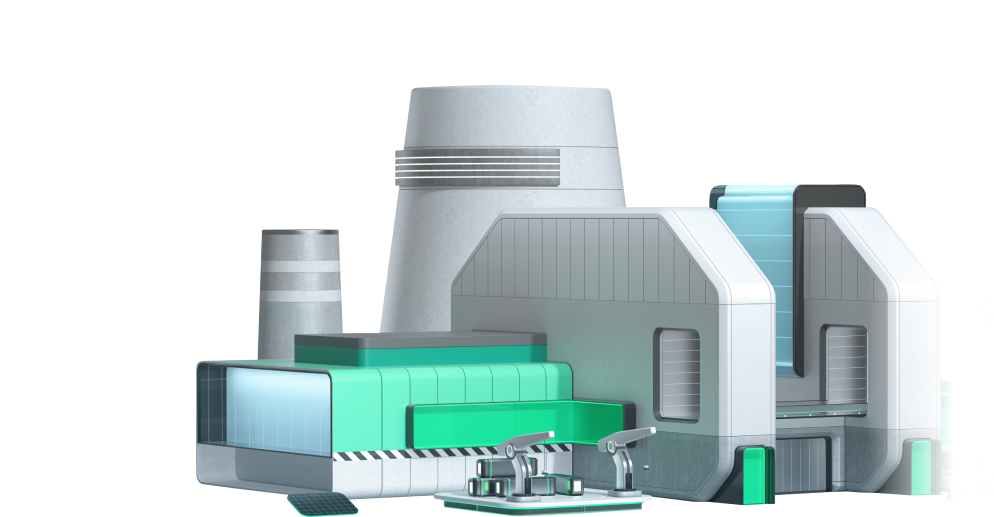

Today, the industrial world increasingly embodies the concept of Industry 4.0, where smart devices and systems minimize human involvement in production processes. The new industrial revolution is associated primarily with the rapid growth of the internet of things (IoT): thanks to high-tech sensors, devices on industrial networks are now capable of sharing and processing data. This dramatically improves the efficiency of production through quick and flexible configuration, incident prevention and more efficient use of resources.
Modern cyber-physical systems streamline many production processes. For example, smart sensors monitor air quality in real time and turn on filters and air conditioners when needed, and machines analyze their degree of wear and notify operators about the need for maintenance. Manufacturers of, say, turbines can receive real-time telemetry data from the equipment they make and instantly record any abnormal behavior. These capabilities can make industrial infrastructures much safer, and reduce the resources and time spent managing them.
Data is of great value in the Industry 4.0 era. System performance and, by extension, business profitability depend on how effectively information is collected, processed and interpreted.
Despite the rapid evolution of industrial IoT, modern industrial control systems are still often a combination of technologies, standards and protocols that may be partially outdated, no longer supported, insecure or inherited from previous software versions. The documentation, protocol specifications and other data can be found in the public domain, as can descriptions of vulnerabilities and practical hacking manuals.
Whether they are connected directly or indirectly to public networks, industrial automation systems are at serious risk. According to a Kaspersky survey, nearly half of all manufacturing plants in the world were targeted by cyberattacks in 2019. IBM says the global number of cyberattacks on industrial control systems increased by 2000% between 2019 and 2020 due to the Echobot malware, which exploits vulnerabilities in IoT systems.
Effective protection of industrial digital infrastructures can be ensured with solutions and services that are tailored to the industry. It is also important to follow global trends and practices in the field of industrial automation cybersecurity.
Both applied and built-in security helps to minimize the risks. KasperskyOS can help develop reliable solutions for industrial IT infrastructures with enhanced security requirements. With our OS at the heart of smart control systems, PLCs and other IoT components, you can ensure that they run smoothly and minimize the risk of cyber incidents.
Today, the industrial world increasingly embodies the concept of Industry 4.0, where smart devices and systems minimize human involvement in production processes. The new industrial revolution is associated primarily with the rapid growth of the internet of things (IoT): thanks to high-tech sensors, devices on industrial networks are now capable of sharing and processing data. This dramatically improves the efficiency of production through quick and flexible configuration, incident prevention and more efficient use of resources.
Modern cyber-physical systems streamline many production processes. For example, smart sensors monitor air quality in real time and turn on filters and air conditioners when needed, and machines analyze their degree of wear and notify operators about the need for maintenance. Manufacturers of, say, turbines can receive real-time telemetry data from the equipment they make and instantly record any abnormal behavior. These capabilities can make industrial infrastructures much safer, and reduce the resources and time spent managing them.
Data is of great value in the Industry 4.0 era. System performance and, by extension, business profitability depend on how effectively information is collected, processed and interpreted.
Despite the rapid evolution of industrial IoT, modern industrial control systems are still often a combination of technologies, standards and protocols that may be partially outdated, no longer supported, insecure or inherited from previous software versions. The documentation, protocol specifications and other data can be found in the public domain, as can descriptions of vulnerabilities and practical hacking manuals.
Whether they are connected directly or indirectly to public networks, industrial automation systems are at serious risk. According to a Kaspersky survey, nearly half of all manufacturing plants in the world were targeted by cyberattacks in 2019. IBM says the global number of cyberattacks on industrial control systems increased by 2000% between 2019 and 2020 due to the Echobot malware, which exploits vulnerabilities in IoT systems.
Effective protection of industrial digital infrastructures can be ensured with solutions and services that are tailored to the industry. It is also important to follow global trends and practices in the field of industrial automation cybersecurity.
Both applied and built-in security helps to minimize the risks. KasperskyOS can help develop reliable solutions for industrial IT infrastructures with enhanced security requirements. With our OS at the heart of smart control systems, PLCs and other IoT components, you can ensure that they run smoothly and minimize the risk of cyber incidents.
A key technology for increasing the performance of industrial systems is the internet of things, a complex infrastructure consisting of many components at various levels. One component to which all devices in any IoT system connect is the gateway. It is through it that information is transferred to data centers for further processing and storage. By protecting the gateway, you can minimize the risks to all other IoT components at production facilities.
Kaspersky IoT Secure Gateway, powered by KasperskyOS, is the key product of the Kaspersky IoT Infrastructure Security solution. It is installed on the edge between IoT infrastructure and external data networks. The gateway blocks attacks on smart industrial control systems, equipment and information-sharing channels. It identifies unauthorized network connections, provides secure updates and configuration of software and transfers control instructions to actuators, helping systems run smoothly.
Convenient centralized configuration and management of the events of Kaspersky IoT Secure Gateway are provided by Kaspersky Security Center. It enables an administrator to monitor the status of gateways from a single point and timely respond to incidents.